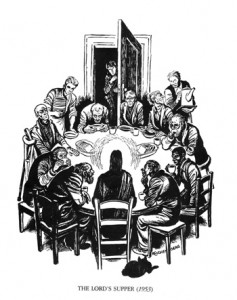One Sunday in July, at my parish church, a homeless man sat on a bench outside. Just before Mass started, he walked in to attend. Then, after Mass, he stood under an awning where his fellow congregants greeted one another. He was ignored. Yet everywhere this man sat or stood, Christ was present in his body.
Why did we not recognize Jesus’ visitation?
Jesus’ visit in the distressing disguise of the poor is a stern mercy and a hard privilege. When Jesus comes to me in another person who is suffering, he invites me to see his own suffering, how he is suffering with this person. Jesus conforms me to himself by inviting me to suffer with him, too. And as I allow myself to be with this other person and accept his suffering, I remember that Jesus is with me, bearing not only this present pain but all the brokenness I’ve ever undergone. I remember also the many times that the roles were reversed: those blessed times when I, a poor person, received the loving accompaniment of Christ in another.
Entering into another’s pain is a painful but strengthening lesson, a spiritual workout. No wonder none of us wanted to undergo it on that Sunday morning in July.
I didn’t want to, but I made the approach. I saw this man in front of me and felt uneasy about him. A sharer in Jesus’ strangeness, he was meek—not shouting, not crying out, not making his voice heard in the streets. He was like everybody else, yet bore our pain in a way we did not want to see. I remember the agony I saw at times cross his face—intense suffering, the pain of a man under the yoke of sin. That included our sin in ignoring him, and my hesitancy to approach him. My first moments with this man were halting, tentative and delayed—I long to have them back. I wish I’d done better in letting him know he was loved. Still, I tried to make the church grounds safe for him, and me, to admit we needed help: the loving help that our God wanted to give us in one another.
Christ holds nothing back from us in offering the sacrifice of the Mass. At this moment, as I encountered this man, I could not hold back from giving Christ’s own unreserved gift to another person. I had to give it out. Jesus had encountered me in the Mass and given me hope: that Sunday was the one-year anniversary of a very distressing time in my life, which I survived. Not only did the incarnate Christ ensure I survived, he incarnated himself in me, incompletely and for a brief moment, when I went to greet this man one year later.
This man and I eventually ate a meal together. As we did so, we continued to celebrate Eucharist and gave thanks to the Father. This man’s presence to me, and mine to him, were only made possible by his Son’s self-gift. As Vatican II puts it, the Eucharist is the “source and summit” of our life in him. We are a chosen people, chosen precisely in the Eucharist. We are members of a new covenant sealed in Christ’s blood.
Yet we act as though we were the ones who chose God in Christ, not he who chose us. We choose where to attend Mass based on our preference. We enclose the vineyard of the Church and, by ignoring Jesus, make him unwelcome. When he arrives, we murmur against him in our hearts: Do you not realize that the Eucharist is time for us to be among ourselves?
Some of us remain in this state of near-total rebellion against Jesus’ presence in the Eucharist. (Pew reports that 70% of self-identified Catholics do not believe in the Real Presence.) Others of us recognize that the Eucharist is about God, too, and not just about us—but we get the priority wrong. We, though Catholic, can hold silently to a belief from the Protestant tradition: Jesus is in the Eucharist because we are there to receive him. No! Jesus is the Eucharist whether anybody receives him or not. Jesus says, “This is my body” before we receive him, and his words do not pass away.
Some of us, finally, don’t believe there’s any reason to receive the Eucharist at all. We believe we have the strength to do good deeds without Jesus’ food for the journey. And besides, we believe that God is already “all in all.”
If we believe that the world is not still in rebellion against God, we are deceiving ourselves. The union between God and all people has not yet come about because we have not yet accepted it. If we had, we would not be so disturbed by the poor, who remind us how thoroughly empty we are while remaining in the body. All of us still suffer the effects of sin. All of us still experience the pain of being cut off from God. The point is to embrace the suffering Christ as he visits me, to tune into the radio frequency that transmits his sufferings in the poor. If I try to jam the signal, I cannot hear my own heart.
Houston Catholic Worker, January-March 2023, Vol. XLIII, No. 1.


